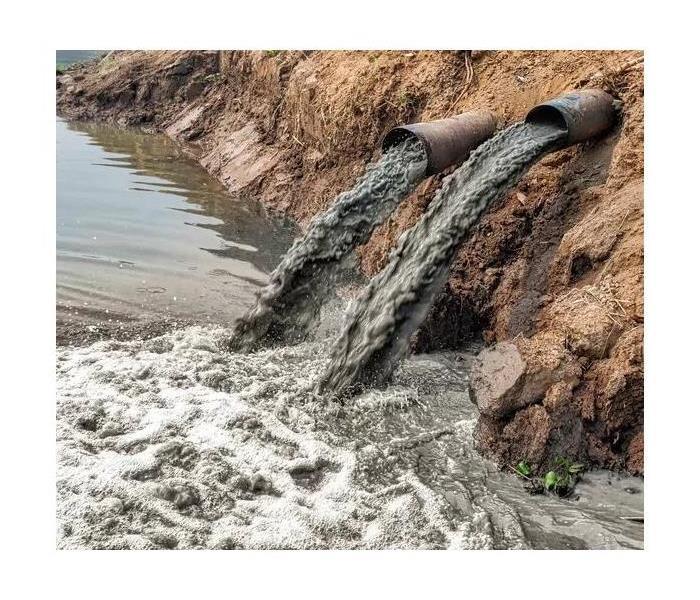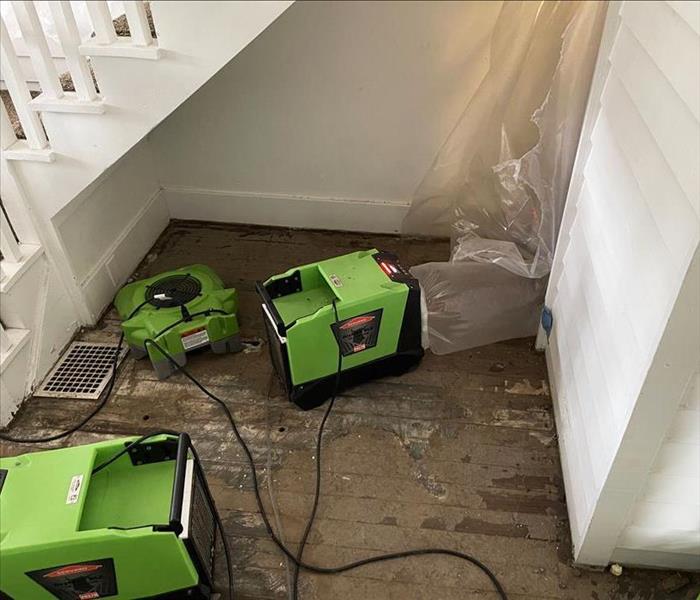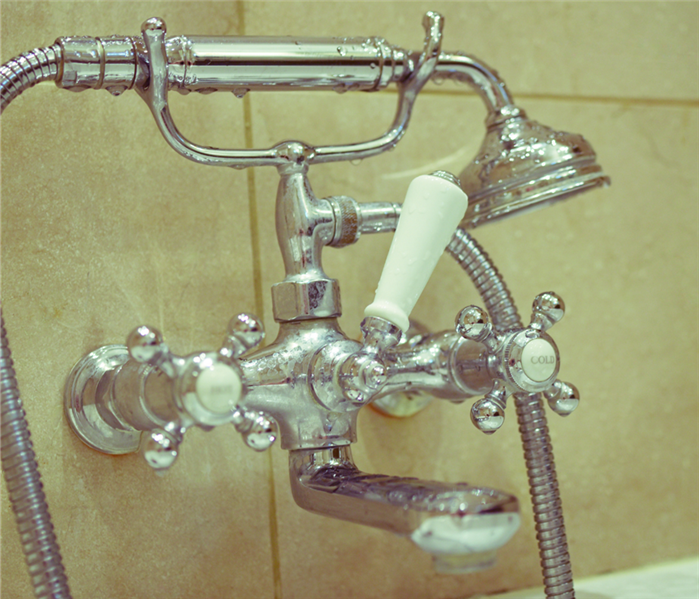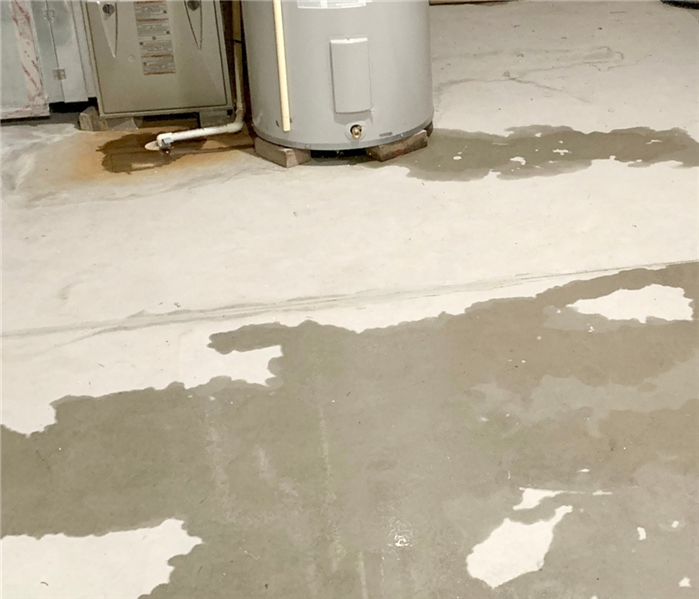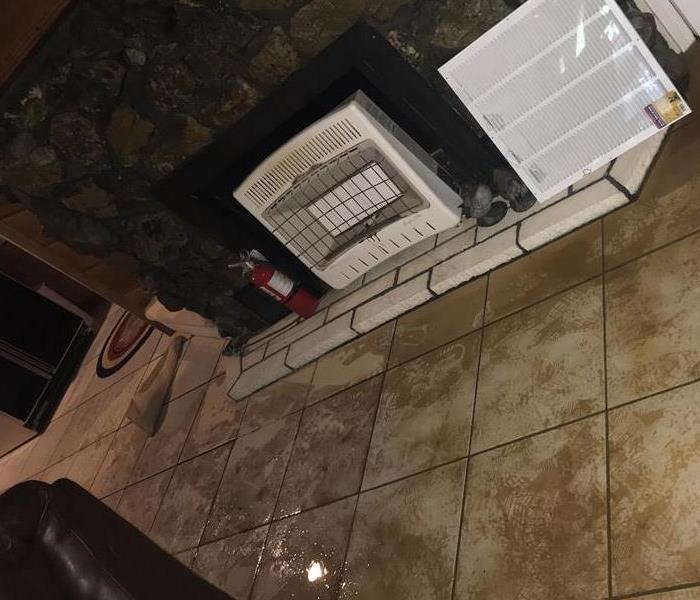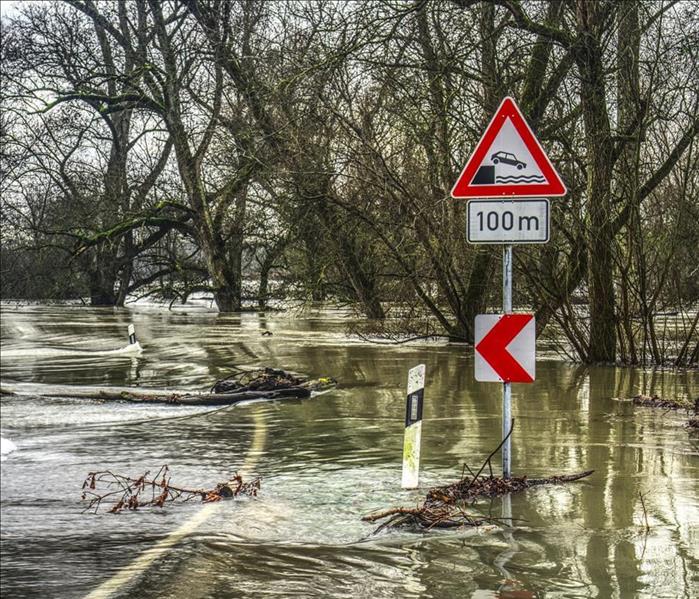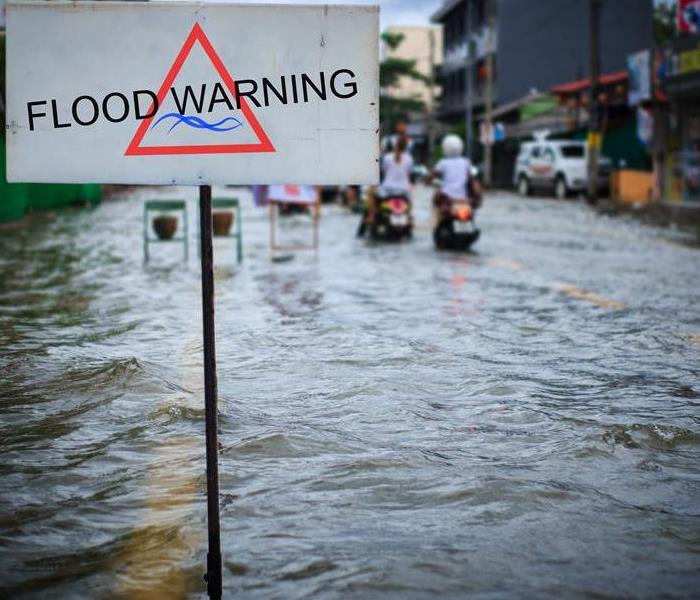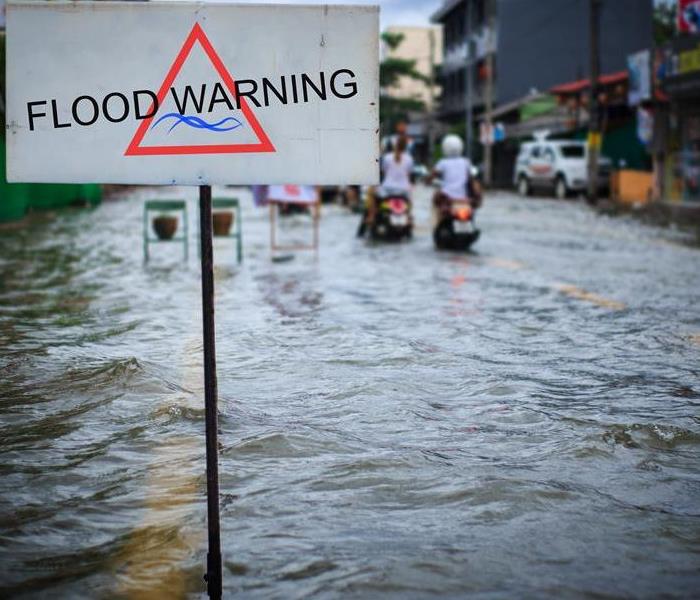Archived Water Damage Blog Posts
April Showers Bring May Water Damage
4/16/2024 (Permalink)
As the saying goes, "April showers bring May flowers," but they also bring potential water damage challenges for homeowners. Springtime rains can be relentless, posing risks to properties and creating a need for vigilant maintenance. In this blog post, SERVPRO of Jackson/Crockett County provides essential tips to help you safeguard your home from the perils of spring water damage and navigate the restoration process effectively.
Inspect and Clean Gutters: Gutters play a crucial role in directing rainwater away from your home's foundation. Over time, leaves, debris, and winter buildup can clog gutters, causing water to overflow and potentially infiltrate your home. Regularly inspect and clean gutters to ensure proper drainage.
Evaluate Your Roof: Your roof is your first line of defense against spring showers. Inspect it for loose or damaged shingles, as well as any signs of wear and tear. Addressing roof issues promptly can prevent leaks and water damage to your home's interior.
Seal Windows and Doors: Ensure that windows and doors are properly sealed to prevent water infiltration. Check for gaps, cracks, or damaged weatherstripping, and replace or repair as needed. Proper sealing not only protects against water but also improves energy efficiency.
Check for Foundation Cracks: The foundation is a vulnerable point for water intrusion. Inspect your home's foundation for cracks or gaps and seal them promptly. This helps prevent water from seeping into basements or crawl spaces, reducing the risk of flooding and mold growth.
Install Sump Pump and Battery Backup: If your home is prone to basement flooding, consider installing a sump pump. This device helps prevent water buildup in low-lying areas. Additionally, having a battery backup ensures continued operation during power outages, providing extra protection during heavy rainfall.
Landscaping Considerations: Proper landscaping can help divert water away from your home. Ensure that the ground slopes away from the foundation, preventing water from pooling around the base of your home. Use mulch to help absorb and manage water runoff.
Monitor Indoor Humidity: Spring showers can contribute to increased humidity levels indoors. Use dehumidifiers in areas prone to dampness, such as basements, to maintain optimal humidity levels and prevent mold growth.
Act Swiftly in Case of Water Damage: Despite preventive measures, water damage can still occur. If you notice signs of water intrusion, such as water stains, dampness, or a musty odor, act swiftly. Contact SERVPRO of Jackson/Crockett County for professional water damage restoration services. Our experts are equipped to assess, mitigate, and restore your property to its pre-damage condition.
Document and Communicate: In the unfortunate event of water damage, document the affected areas and contact your insurance provider promptly. Communication is key in expediting the claims process and ensuring that necessary restoration steps are taken promptly.
Water Contamination Categories
3/29/2023 (Permalink)
Flooding can have a devastating impact on your commercial or residential property
It can be difficult to predict the full extent of water and storm-related damages. Extracting the water is just the first step that our professionals take to thoroughly dry and restore water and storm-damaged areas inside and outside of your property. Floodwater is dangerous, and it is advised to contact a reliable property damage restoration company such as SERVPRO Team Caldwell which specializes in natural disaster and flood cleanup and remediation. It can be difficult for the average property owner or management team to determine if the contaminated areas and contents of your property have been properly remediated, to avoid continued damage from mold growth. Our restoration technicians are IICRC trained and certified with countless hours of experience responding to local property damage cleanups and repairs. While assessing your property damage, SERVPRO Team Caldwell will help determine what parts of your loss our team can clean, sanitize and restore. Our restoration teams work closely with our construction crews and management to provide a seamless transition from destruction to reconstruction. That's why it's best to call a local property disaster restoration company like SERVPRO Team Caldwell to fill in the blanks. Our Professional staff will come and inspect your damage and customize a removal, cleanup, and restoration solution to get your property damage reversed as quickly and effectively as possible.
Different Types of Contaminated Water Categories
- Category 1: Clean water originates from a sanitary source such as a broken pipe, or another water source; rainwater is also considered clean and poses no substantial risk from dermal, ingestion, or inhalation exposure. However, it may not always remain clean after it meets other surfaces or materials.
- Category 2: Gray water is used to classify slightly contaminated water and has the potential to cause discomfort or sickness if contacted or consumed by humans. It may contain potentially unsafe levels of microorganisms or nutrients for microorganisms, as well as other organic or inorganic matter (chemical or biological).
- Category 3: Black water is highly contaminated and filled with pathogenic, toxigenic, or other harmful agents. Such water sources may carry silt, organic matter, pesticides, heavy metals, regulated materials, or toxic organic substances. Black water is typically caused by sewage damage, flooding or any type of natural disaster; black water should always be handled by trained professionals. Different types of contaminated water pose different risks, but the longer the water stays in a home, the more severe the property damage it will cause and the greater the threat to your health. Also called black water, Category 3 water is water from sewage backups and overflowing rivers that contains various hazardous contaminants, sewage, and/or toxic debris. According to the Institute of Inspection Cleaning and Restoration Certification (IIRC) and the Environmental Protection Agency (EPA), all water originating from seawater, ground or surface water, rising rivers and streams, and wind-driven rain from hurricanes and tropical storms is considered Category 3.
The Water Restoration Process
3/30/2022 (Permalink)
When experiencing the first few moments of a water disaster, you are typically flooded with emotions while also trying to quickly figure out what to do next. Knowing what to do in the event of a water disaster will allow for a faster restoration process, and will save you time and money.
If water damage is left unaddressed for a while, secondary damage can occur. SERVPRO of Jackson/Crockett County is your 24-hour emergency water and fire restoration company. We are “Faster to any size disaster” with our six-step water damage restoration plan.
6 Steps Water Damage Restoration Plan
- Initial Emergency Contact
Water disasters are typically unexpected and hardly ever occur at an ideal time for home or business owners. This is why SERVPRO is available and prepared 24/7 to help you when disaster strikes. Once you have made the initial phone call, a SERVPRO professional will ask you important questions regarding the situation. Our goal is to gather as much information about the disaster and draft a response plan specific to your situation. This response plan gives us an idea of how many technicians and equipment are needed to start the restoration process at your home or business.
- Inspection & Damage Assessment
Once SERVPRO technicians are on-site, we will immediately verify that the property is safe and take the necessary measures to prevent any further damage to the affected area if it is within our capabilities. Once your property is safe and secure, we will then conduct a thorough inspection of the affected areas to determine the next best course of action. We will then report our findings to the home or business owner.
- Moisture Extraction
To prevent the development of mold or other secondary damage, SERVPRO technicians begin to quickly extract standing water that can seep into belongings surrounding it. Our high-performance grade vacuums and water pumps accomplish this task rapidly and can remove hundreds of gallons at a time.
- Dehumidifying & Drying
After all of the standing water has been extracted, the moisture removal process can begin. SERVPRO dehumidifiers and high-grade dryers are used to pull moisture out of the air and out of porous surfaces in your home or business such as wood or fabrics. This process is what deters mold from growing and can help prevent further damage.
- Cleaning Belongings
All items that have come into contact with the water are prone to becoming a contamination hazard. The water may have come from a clean source, but the water passes through other unknown materials. This is why we take the sanitization process so seriously. To prevent hazards, SERVPRO of Jackson/Crockett County will thoroughly remove unwanted microbes from your belongings. SERVPRO also provides a deodorization service that removes musty, water-damage smells.
- Restoration & Repair
Once on the scene, SERVPRO will see your home or business restoration through to the end. You can count on us to never leave you with a partially completed job. SERVPRO not only handles the cosmetic aspects of the restoration process, but we tackle the construction details too. SERVPRO of Jackson/Crockett County can repair structural damage, apply paint and complete the finishing touches on your home or business “Like it never even happened.”
3 Ways To Identify A Tub or Shower Leak
3/25/2022 (Permalink)
Water appliances in your home such as sinks, tubs, showers, dishwashers, and washing machines are often the cause of many water disasters. Depending on the location of the appliances, water leaks can cause quite a bit of damage on both levels of your home. For example, if a bathtub leaks on the second floor, water will travel down into the first floor of your home. As the water travels, it will weaken the ceiling on the first floor and drywall on both levels. If the water is not properly extracted and dried, moisture will build and hidden mold will begin to grow. Due to the location of the leak, the mold may be difficult to remove as time goes on. If you are having issues with your tub or shower, there are a few ways to identify potential leaks.
- How Old Is Your Shower Pan?
There can be many causes of shower leaks, but age is one of the most common. Shower pans are supposed to last for a long time, but after three or more decades, they begin to expire. If your home has a crawl space and you start to notice discoloration in your tiles around the base of the shower, it may be time to inspect your crawl space for leaks. This may be an indicator that your shower pan has seen better days.
- Are There Old Water Stains On The Ceiling?
If a bathtub leak or failed shower pan, especially on the second floor, is left unattended for a length of time, it can cause a dangerous situation. The water weakens the floor and causes the ceiling to sag. If the cause of the leak is never identified or fixed, repeated leaks could cause mold growth inside your ceiling. If you notice stains on the first floor of your home, directly below a second-floor bathroom, you may have a leak.
- Check Out You Shower Tiles
You can learn a lot about your unit by looking at your shower tiles. Tiles on the bottom half of the shower fall off or become loose if a shower pan leak occurs. You can assume there is a leak somewhere behind the tile if the wall feels damp or looks moldy.
If you are experiencing leaks from your tub or shower and need water clean-up, restoration, and construction services, call SERVPRO of Jackson/Crockett County at 731-423-9944. We’ll handle all of it and make your water disaster “Like it never even happened.”
How To Minimize Damages From A Leaking Hot Water Heater
3/18/2022 (Permalink)
No one wants to experience the aftermath of a broken hot water heater! SERVPRO has responded to many emergency water calls where broken hot water heaters have done a tremendous amount of damage to customers’ homes. If you hear funny sounds coming from your hot water heater, investigate and address the issue immediately! Below are some steps you can take to help minimize the impact a broken hot water heater can have on your home.
What Can I Do To Help Minimizing Damage?
Following these mitigation steps can help prevent any further damage to your home..
- Shut off the power supply.
- Shut off the water.
- Drain your water heater.
- Flip open the pressure-release valve.
- Rinse the water heater with cold water.
What Goes Into The Cleanup Process?
After your hot water heater leak has been fixed, it is important to clean up any remaining water or damage that occurred due to the leak. If you allow water to sit for any length of time, it creates warm and moist areas in your home. This can lead to a lot of problems such as the development of mold, germs, fungus, and other types of pathogens.
Some cleanups can be taken care of with a towel, but larger pools of water require professional extractions. Materials in your home such as carpet, walls, and wood tend to absorb and hold in moisture. To eliminate the possibility of hidden mold growth, SERVPRO will dry out your carpets and areas behind your walls.
In a situation where your leaking water heater has caused a substantial amount of water damage, our professional SERVPRO water mitigation specialists can help keep your water disaster from becoming an ongoing process! If your home isn’t properly dried out within the first 48 hours, you could be looking at substantial damage. We are “Faster to any size disaster” and are “Here to help.”
Category Three Water
2/23/2022 (Permalink)
There are several different types of water SERVPRO professionals encounter during water mitigation. Water categories are divided into three different levels. Category three, black water, is the most dangerous type of water and should be professionally extracted and cleaned immediately. What is considered a category three water disaster?
Category Three - Black Water
Grossly contaminated water is considered a category three water damage. This category can contain pathogenic, toxigenic, or other harmful chemicals. Sewage, toilet backflows, seawater flooding, rivers or streams, or ground surface water can be considered category three water damage. Since its source is unknown, any contaminated water entering the indoor environment from outside is a category three water disaster.
SERVPRO of Jackson/Crockett County technicians are qualified to handle the different categories through training and hold leading certifications in the industry. Untreated category three water leads to an increased risk of sickness to you and your loved ones. Please do not hesitate to call our 24-hour emergency services! We are “Faster to any size disaster” and will make your disaster “Like it never even happened.”
Category Two Water
2/16/2022 (Permalink)
Several factors come into play when determining the type of water in your home or business after a disaster. Water is broken down into three categories and ranked based on the water's contamination levels. Understanding what is in the water helps SERVPRO professionals handle the mitigation process safely.
Water may have come from a clean, uncontaminated source, but with time, the water can travel and pass through other materials causing contamination. Understanding the different types of water categories listed below could help keep you and your family safe and better understand the situation you are dealing with.
Category Two - Gray Water
Category two water damages are typically more severe. Due to the potential presence of microorganisms, debris, and chemicals, a more intense extraction process is required. If left unprofessionally treated, category two water can quickly turn into category three water. SERVPRO of Jackson/Crockett County has seen category two water damages from broken aquariums, overflowing dirty dishwashers or washing machines, overflowing toilets containing urine, and many other unfortunate situations.
SERVPRO of Jackson/Crockett County professionals are certified in water mitigation and can extract any category of water. We are “Here to help” and can make your disaster “Like it never even happened.”
Water Emergencies: What Can I do?
2/16/2022 (Permalink)
When experiencing a water emergency, it is hard not to panic. Be sure to pause, take a deep breath, and give SERVPRO of Jackson/Crockett County a call. We will quickly send our highly trained water technicians your way to evaluate the situation and get the mitigation and restoration process started as soon as possible! Our goal is to help return your home to its preloss condition, involving as little stress as possible. Cleanup & remediation are our top priorities when we arrive at your property. While we are on our way to your home, there are a couple of things you can do to help prevent secondary damage to your property and belongings.
The steps listed below are beneficial, but only if the water damage was caused by a clean water break. If you are dealing with damage from the sewer, toilet, or other contaminated water sources, it is important to stay away from the scene. That level of water contamination would be considered a category 2 or 3 water damage and could lead to adverse health effects.
Here are a few things you can do while waiting on our trained SERVPRO technicians to arrive:
- If it can be done safely, cut the water off at the source.
- Use a mop or towels to remove any excess water.
- To speed up the drying process, remove or pop up wet upholstery cushions.
- Don’t attempt to wash cushion covers in the washing machine.
- Lift furniture up on wooden blocks or wrap aluminum foil around the legs to prevent further damage.
- Be cautious when moving wet furniture. Water will make items heavier than they appear.
- All furs and leather goods should be hung separately at room temperature and not piled up on top of one another
- Removing colored rugs from wet carpeting will help prevent dye from running and staining it.
- A wet/dry shop vac could be used to help suck up water if you have one.
- Do not turn on your lights or overhead fans if the water damage is in the ceiling.
- Do not stand underneath ceilings that are starting to sag from pooled water.
If you are experiencing any doubts, it is better to not attempt anything! Once we arrive, we will evaluate the system and will communicate to you the steps that need to be taken to return your home to its preloss condition.
SERVPRO of Jackson/Crockett County is “Faster to any size disaster” and will take care of all your restoration and reconstruction needs.
Category One Water
2/11/2022 (Permalink)
When SERVPRO Professionals respond to a water emergency at your home or place of business, their goal is to locate the source of the water leak and determine if the type of water is a category one, two, or three. The water source and what caused the damage helps to identify the “category” of water.
Category One - Clear Water
Category one water is the cleanest, most non-toxic type of water and does not cause a threat to dermal, ingestion, or inhalation exposure. Category one damages are typically sourced directly from the tap. After over 30 years of experience, SERVPRO of Jackson/Crockett County has seen category one water losses originated from sinks or tubs overflowing with clean water, broken water supply lines, falling rainwater, and faulty appliances associated with water-supply lines.
However, even category one flooding can flow through electrical systems or structural faults. Situations such as this cause safety concerns and repairs should be handled by a professional. After the water leaves its source, it can come into contact with harmful materials and different surfaces.
SERVPRO of Jackson/Crockett County professionals are highly trained and certified to extract any water category. If left untreated, category one water can degrade into category two or three. Please do not hesitate to call our 24-hour emergency services!
Checked Your Hot Water Heater Lately?
11/30/2021 (Permalink)
Have you ever heard your hot water heater pop? Is your tap water a brown or rust color? These are just a few indicators that you might need to check your hot water heater! SERVPRO of Jackson/Crockett County has responded to many water heater-related water losses over the years. It is important to remember to inspect your hot water heater at least 2 to 3 times a year for sediment build-up, excessive internal pressure, and rust corrosion.
Sediment Build-up
If you have ever heard your hot water heater pop or make a knocking sound, you may have a build-up of sediment in your hot water heater. Sediment refers to the compilation of minerals inside your hard water. With time, sediment piles up at the bottom of your water heater tank. This layer of sediment creates an unwanted barrier between the water and the burner element. This problem will eventually force the burner to work overtime and will cause overheating. An excessive amount of overheating will deteriorate the tank. To avoid a build-up of sediment in your hot water heater, you should flush and drain your tank once every year.
Internal Pressure
Your water heater tank will eventually spring a leak and burst if too much pressure builds up in it. To prevent this from occurring, the tank has a temperature and pressure relief valve. The T&P relief valve’s purpose is to release water, keeping the pressure down at a much safer level. Unfortunately, despite the valve, the extra pressure can deteriorate the tank over the years. Testing the T&P valve a couple of times a year can help alleviate pressure in the tank. Always keep the temperature of your water heater between 120° F and 125° F. If you set the temperature for anything higher than that, the chances of you increasing the pressure in your hot water heater tank are greater. Not to mention, you could scald yourself.
Rust Corrosion
If you have ever noticed that your hot tap water is a brown or rusty color, you may be facing rust corrosion. Since water heaters are made of steel, water will cause the tank to rust over time. As an internal rust protection element, a 3-5 foot anode rod rusts in place of the tank. After the rod begins to show signs of deterioration, it signifies to you that your water heater is next. To catch rust corrosion in your water heater, your anode rod should be inspected once every two years. The rod will most likely need to be replaced every 4 to 5 years. If you have softer water, you may have to replace it sooner.
We're In Hot Water Now!
11/10/2021 (Permalink)
Here at SERVPRO, we have seen the destruction a busted hot water heater can do to your home. Recently, we responded to a massive water loss caused by a leaking hot water heater underneath a staircase. The water traveled out of the staircase closet and into the basement den, two bedrooms, and second kitchen.
Since the homeowners spent most of their time upstairs, the hot water heater poured water into the basement of their home for hours undetected. SERVPRO promptly extracted all of the water from the entire lower level of the home. Afterward, the area required several days of drying to be thorough.
We hope this is something you and your family never have to experience! Here are just a few hot water heater safety precautions to follow that may prevent you from having a similar fate.
- Eliminate Fire Hazards
- Hot water heater tanks are quite large and not so pretty to look at. For our convenience, most hot water heater tanks are tucked out of sight. It is very tempting to use the extra closet space or area surrounding the hot water heater for additional storage. However, that is a recipe for disaster. If you have a gas water heater you should remove anything and everything near the water tank that is combustible. Never store anything like coats, jump ropes, garbage, or canisters of gas anywhere near your water heater. One crack in the water heater or a leak of fumes can form a chemical reaction. Combined with flammable materials can lead to a devastating disaster!
- Properly Ventilate Your Hot Water Heater
- Vents that are not installed properly can cause fumes to travel throughout your home. Vents with improperly placed drafts or ducts can also cause fumes to funnel into your home rather than ventilate outside. It is important to make sure that your water heater vents are dip-free, that they are the same diameter as the tank’s diverter, that the vents are properly screwed in, and pointed in the right direction.
- Test Your T&P Relief Valve Regularly
- What is a T&P Relief Valve? T&P is short for temperature and pressure. The T&P Relief Valve was created to prevent your water heater from exploding if the temperature or pressure of the tank increases greater than a safe amount. Residential valves tend to fail, so it is wise to check your T&P Valve at least once a year. A faulty valve can result in tragic combustion. The explosion can result in extensive damage to your home, or more importantly, resulting in harm to you or your family.
- Purchase A Carbon Monoxide Monitor
- As previously mentioned, if your hot water heater is not properly ventilated it can also cause fumes to leak into your home. Gas water heaters should always be accompanied by a carbon monoxide monitor. Carbon monoxide poisoning is a colorless and odorless gas that silently kills many people each year.
Fall & Rainfall
9/30/2021 (Permalink)
Happy Fall! While fall leaves are beautiful, they can also cause ugly issues for homeowners when mixed with rainfall. Your friends here at SERVPRO want to remind you that if leaves are not removed frequently from your gutters, they can pile up and cause potential water damage to your home.
Here are a couple of reasons why regular gutter maintenance is so crucial during this time of year! Clearing debris prevents water accumulation, water damage, and fungal growth on your roof and in your home. Gutters, packed full of leaves, accumulate water along the roofline of your home as well as areas near the opening of your downspout when it begins to rain. When a blockage occurs, it begins to decrease the structural integrity, and longevity of your roof if not promptly addressed! If there are lockages in your downspout, it can also cause pools of water in your yard, unwanted drainage in your crawl space, and water ruts to form in your flower beds or yard.
Not only does this accumulation of water cause damage to your yard and roof, but it also can cause leaks in the interior of your home. These leaks can cause water damage to your ceilings, ceiling lights, walls, and can even reach down to your floors. This has the potential to cause fire hazards as well as trap moisture in your walls.
When leaks are left unattended for an extended period, mildew and other hazardous fungal growths such as algae, moss, mildew, and mold can be present. Fungal growth can decrease the aesthetic appeal of your home when it forms green and black spots that appear on your interior walls, roof, and exterior walls. More importantly, exposure to hazardous mold poses a direct threat to you and your family.
If you find yourself facing any of these issues this fall, don't do it alone! Your SERVPRO professionals are here and happy to help you any way we can! We will make it "Like it never even happened,” so you can continue to enjoy this beautiful time of year!
TIPS FOR WHEN WATER HITS
9/20/2021 (Permalink)
After placing a call to SERVPRO for water damage, our certified crew is headed your way and is ready to get to work on restoring your home as soon as possible! In addition, there are a couple of things you can do to prevent any further damage while we are en route to your home.
The first thing you can do is try removing as much water as you can by blotting or mopping. The second thing you can do is pick up any colored rugs, fabrics, books, and magazines to prevent these items from bleeding into the carpet. Third, do not use your household vacuum cleaner to soak up the water! Using a standard vacuum is extremely dangerous due to electrical hazards and will damage your vacuum. To achieve maximum drying, turn on your air conditioner instead. Fourth, to prevent your furniture from any further damage, place aluminum foil or wood blocks under furniture legs.
No one knows what the future holds, but you do know who to call when the future holds water damage! Your team at SERVPRO hopes these tips are beneficial and can be used to help you in case of unexpected water damage.
Water! Now What?
9/14/2021 (Permalink)
In the event of water damage, timely mitigation is crucial. Water takes the path of least resistance. If not extracted immediately, a substantial loss can occur. Saturated carpets, padding, subfloor, drywall, furniture, and draperies are among the most common losses homeowners face. In regards to water damage mitigation, the sooner the better! Here at SERVPRO, we offer a 24-hour immediate response emergency service, and restoring your home properly is our top priority! Knowing some emergency water damage tips beforehand can also be extremely beneficial in case of an unexpected crisis.
While we are en route to your home, there are several safety precautions and tips you should know! First, it is important to stop the source of the water if at all possible! Second, be extremely mindful of potential electrical hazards. Third, if your ceiling is wet, do not turn on ceiling fixtures and stay away from areas where the ceiling is sagging due to retained water! Also, do not use any appliances while standing on wet concrete, carpet, or floors!
We make it our mission to help our customers as soon as we possibly can, but these helpful tips can save you from additional loss and keep you safe! We take your water loss very seriously and know that time is of the essence to salvage as much as possible. Please, don’t hesitate to call us for any of your water cleanup needs!
Be Prepared For Rainfall
3/16/2021 (Permalink)
While severe weather impending weather approaches our area, we have a few tips for you to make sure you hopefully avoid a water damage.
?? Be sure to keep doors and windows closed to assure that water doesn’t come in
?? Check your gutters before any rain starts to make sure that there are no blockages so water is free to flow
?? Make sure if you are in a flood zone to take the precautions to avoid water coming into your home
?? Make sure your basement doors are protected from the intrusion of water
These are just a few tips that could help you to prevent a potential water damage to your home or business. With the amount of rainfall we are said to expect we hope that you find these tips helpful.
We can make your house a home again
3/12/2021 (Permalink)
Your home should be your place of rest. But when water begins leaking - even small leaks in areas you can't see - your home could quickly become a source of stress. The possibility of harmful mold, rot and unseen damage may affect the value of your home and the health of loved ones.
SERVPRO of Jackson/Crockett County professionals understand how disruptive water damages can be for your entire family and will help ensure the water is identified, regardless of where it hides. That is why we offer 24-hour emergency response by trained, uniformed restoration professionals. With top-of-the line equipment and time-tested cleanup and restoration techniques, SERVPRO of Jackson/Crockett County has the expertise to help make your house feel like home again.
Hot to protect your home
3/12/2021 (Permalink)
You control every aspect of your home, from your decor to the temperature of your ac. Disaster and destructive damage is the last thing you would want to happen to your home. Water damage is especially destructive and can ruin a home within minutes. Although you can't control when or if you will have water damage, there are a few things you can do to minimize your risk.
- Water Heaters: Water heaters will not last forever. Over time, corrosion will damage the tank and cause leaks. However, you can prevent this by installing a tray or drip pan under your water heater.
- Groundwater infiltration: We recommend installing a sump pump to alleviate groundwater from flooding your home. Install an emergency generator so the pump will always be ready to operate at all times.
- Sewer Back-Up: To prevent your sewer from backing up, make sure the main wastewater pipe is fitted with a backflow valve. This valve will need to be inspected regularly by a plumber.
Frozen Pipes
2/10/2021 (Permalink)
Below freezing temperatures for multiple days can wreak havoc on your homes pipes if you are not cautious. Making sure your home is Winter Storm ready is the best way to protect your home.
SERVPRO’s Tips for Keeping Your Home Safe
- Make sure your pipes are properly insulated. This includes the outside spigots as well. This an exposed pipe on your home that would potentially cause a water damage.
- Let your faucets drip. Moving water has the least potential to freeze. A steady drip would be ideal.
- Leave your cabinet doors open. This allows heat to get to those pipes under your sinks. (Keep in mind to put your cleaning supplies in a closet if you have little ones or pets)
If your find yourself in a bind from a burst pipe don’t hesitate to call us. We are a 24/7 Emergency Service.
Water Source
11/9/2020 (Permalink)
A water source can be from anywhere inside or outside your home or business. We have a few tips to help your home be protected from a potential water hazard while you are out of town.
Tips for keeping your home safe from a water damage
Turn your water off at the main valve, if possible
Have someone periodically check your house while you are out of town
Make sure all of your water faucets are off
Do not leave with your dishwasher or washing machine on during a cycle
Take steps to prevent your piped from freezing if you are traveling during the winter months
These are just a few quick tips to think about before traveling. We want to make sure you have peace of mind whether you are at home, on vacation, or traveling for the holidays.
Water Damage Vs. SERVPRO
11/4/2020 (Permalink)
We have had several hurricanes this year. And while we are not along the coast we still get the after effects caused by these storms. We end up with lots of wind, rain, and ground water.
This can cause many stresses on our homes. Employees at SERVPRO are trained on handling each scenario when dealing with water damage. We follow strict guidelines to make sure we don’t cause more damage and to keep your home or business safe from potential peril in the future.
Water left untreated can cause significant mold and other micro organisms to grow. You also do not want to over-dry your home or business. Many materials have some amount of moisture already in them. By over-drying, you can harm the integrity of the material. There is a balance of moisture in the air to the walls and floors. Moisture too high can cause it to be soft and flimsy, moisture too low can cause it to be dry and brittle.
SERVPRO is trained and certified to make sure we know and understand the perfect balance. We are held to the highest of standards to take care of your home without any worries. We understand that water damage can be super stressful. We want to help ease your mind and take some of the stress off of you.
Leak Has Been Found!
4/20/2020 (Permalink)
Water damage can occur in many different shapes and forms. There are times that it is something that happens quickly and all at once and on the other hand it can happen slowly. A customer called me today about a water damage. The damage originally appeared as a leak around the toilet ring. The homeowner changed it out and it seemed to have been fixed. This was a couple of weeks ago. Today he leaned against a wall in his garage and the wall crumbled. Leak has been found! Unfortunately, that’s not how you want to find it but thankfully they thought of us first and foremost. SERVPRO of Jackson/Crockett County is always here for you 24/7, 365. “Like it never even happened.”
No, Just Me
4/13/2020 (Permalink)
Have you ever been sitting at your desk at work and one of the ceiling tiles just crumbled and fell down? No, nobody, just me? Okay, well this happened to me at an office I use to work in. We didn’t think much about it because why would we? We just cleaned up the debris and mess and put a new one up there. What we didn’t know was that water was due to the tiniest little hole in the roof letting just the smallest amount of water drip through to the ceiling tile. We also didn’t realize that this incident would cause many more problems because we didn’t do anything to fix the situation. This caused mold in the ceiling along with under the carpet and the baseboard because it wasn’t dried out properly. Putting a towel down or a little box fan isn’t going to help that kind of situation. So luckily we had SERVPRO on our side to come in and deal with the mold issue we ended up having along with the smallest pinhole in the roof.
I know what you are thinking: that sounds like you could have prevented it. Yes, we could have, but as an outsider looking in that is easy to think. But think about the incidents in your home or office that you play off as nothing or something minuscule and later you figure out that you actually made it worse by sweeping it under the rug.
SERVPRO of Jackson/Crockett County is here for just that. Call us today so we can treat your water or mold issue.
I Have Mold. What Do I Do?
3/25/2020 (Permalink)
There is a lot of confusion and misunderstanding about the topic of mold. Some restoration companies make claims to remove all mold from your home or business. This is false. Mold spores occur naturally almost everywhere. Microscopic spores float along in the air and can enter into your home or business through windows and HVAC units.
- Mold is everywhere
- Mold thrives on moisture. Mold spores can quickly grow into colonies when exposed to water.
- Before mold remediation can begin, all sources of moisture or water must be addressed or the remediation was for nothing and the mold will return.
- Mold often produces a strong musty odor.
- Higher than normal humidity indoors can support mold growth. It is best to keep indoor humidity below 45%.
If you suspect mold growth in your home or business it is best to call a certified professional like SERVPRO of Jackson/Crockett County to address this situation. Our technicians are trained in how to properly treat each mold strain. We also test the mold to be 100% sure on how to remedy your exact mold type.
The Basement in My Alamo Home is Flooding. What Do I Do?
3/19/2020 (Permalink)
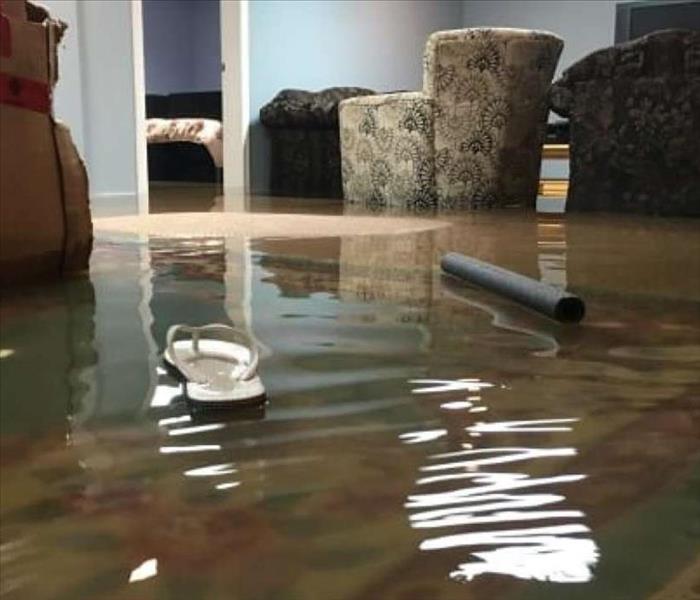 SERVPRO of Jackson/Crockett County has your back during a flood.
SERVPRO of Jackson/Crockett County has your back during a flood.
A basement can flood at any time, flooding typically occurs due to heavy rainfall. Basements are inherently prone to flooding since they are the lowest level of the building, typically built partially or entirely below surface level.
How do I prepare my basement/home for a possible flood?
- Have a qualified professional elevate your furnace, water heater, and electrical panel if these are in an area prone to flooding.
- Install “check valves” in sewer traps to prevent flood water from backing up into the drains.
- Seal wall in your basement with a waterproofing compound to avoid seepage.
What do I need to do if I notice my home/basement are starting to flood?
- Never walk through standing water. You never know if there is electricity running through it.
- Turn off utilities at the main switches or valves if instructed to do so.
- Disconnect electric appliances.
- Do not touch electrical equipment if you are wet or standing in water.
- Do not walk through moving water. Even 6 inches of water and have a very powerful current.
What should I do after the flood in my home/basement?
- Listen for news reports to learn if the community’s water supply is safe to drink.
- Avoid floodwaters. Water may be contaminated by oil, gasoline, or raw sewage. Water may also be electrically charged.
- Stay out of any buildings surrounded by floodwaters.
- Return home only when authorities indicate it is safe.
- Call SERVPRO to help you get your home mitigated and restored.
SERVPRO of Jackson/Crockett County is highly trained and has the most experience in flood/water damage. We can help you get back in your home. “Faster to any size disaster.”
"Itsy Bisty Spider..."
3/18/2020 (Permalink)
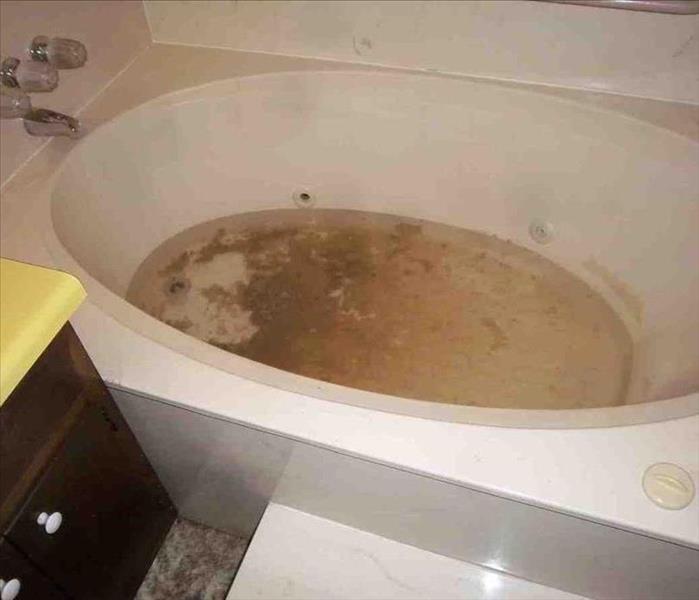 Your sewage backup doesn't have to stink!
Your sewage backup doesn't have to stink!
Does anyone else remember the rhyme “Itsy Bitsy Spider”? I have been thinking about it a lot during these last few weeks. The poor spider would be waiting for the sun to come out a long time here. It feels like we have had nothing but 40 days and 40 nights of just rain. From drizzles to torrential downpours to flooding and throw in some tornadoes as well, it has been what seems like non-stop. It’s safe to say with with all of this rain we have seen it has left Tennessee pretty soggy.
Crazily enough the rain doesn’t just effect the outside of our home. Once the ground gets so wet, wells can’t pump out because the ground is already so saturated. This can actually cause wells to back up into your home through toilets and bathtubs. When this happens it can be an awful mess. This isn’t something you can/want to clean with your typically household chemicals. SERVPRO of Jackson/Crockett County has the perfect solution to help you clean your mess.
We have a team that is biohazard trained. We can remove the sewage, contaminates, and moisture. We can ensure that the structure is properly cleaned, disinfected, and deodorized. We can take care of your mess and get you back, “Like it never even happened.”
Can I Save My Water Damaged Documents
3/13/2020 (Permalink)
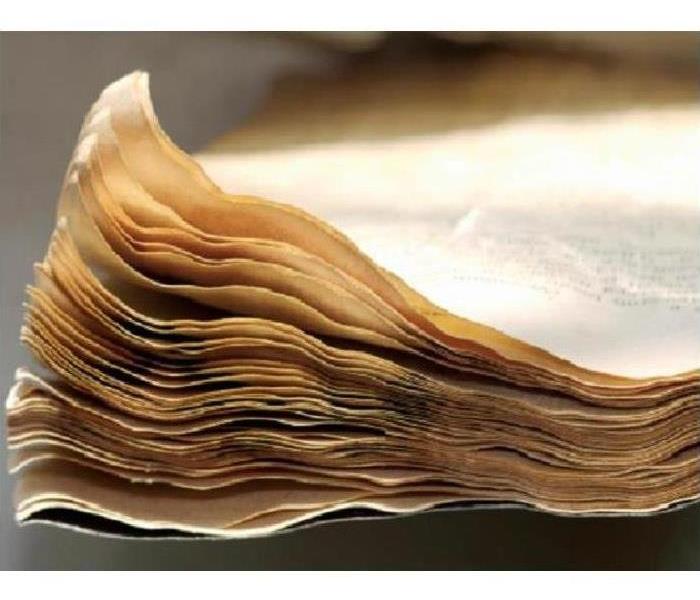 SERVPRO Jackson/Crockett County can restore your important documents
SERVPRO Jackson/Crockett County can restore your important documents
You wake up feeling really ambitious and decide to arrive early at the office to get some extra work in. As soon as you walk through the door, though, you sense something is wrong. There's humidity in the air and your feet are making a squishing noise. You walk a little further into the room and realize immediately that there has been a leak in the roof after last night's downpour. You look around and water is not only covering the floor, but it has also leaked onto a giant bookshelf you have against the wall as well as into several filing cabinets containing important documents. You feel your heart beating in your stomach and ask yourself if it's possible to salvage these documents.
Our answer is, "Yes, it is!" That is, through SERVPRO's innovative vacuum freeze drying method. We employ the same renowned technique used by the Library of Congress to dry out water damaged books.
What exactly is Vacuum Freeze Drying?
It is the most efficient and effective way to salvage your water damaged documents. The vacuum freeze drying process can be used to recover and restore paper files, books, and photographs as well as blue prints, microfiche, x-rays, business archives, etc. Typically, these items are one-of-a-kind or irreplaceable (historical, collectable, legal, medical).
The Document Restoration Team uses a process called “sublimation” to avoid causing more damage to your documents, such as after a flood. Sublimation converts solids into gas.
So, to break it down:
As soon as we get your wet or moist documents, we freeze them in a cold storage space. Damaged documents should be frozen as quickly as possible to stabilize them and prevent further damage. The water in your documents becomes ice, a solid element. Next, using our Vacuum Freeze Drying Chamber, located in Jackson, Tennessee, we extract the ice by sublimation. That is to say that the ice in your papers becomes a gas or water vapor in order to be vacuumed.
This extraordinary technology used by SERVPRO is the only method approved by the National Archives and Records Administration (NARA) and the General Services Administration (GSA).
Why is Vacuum Freeze Drying the best method?
Other methods like dehumidification can alter the structure of the paper’s fibers causing them to become more brittle.
How do I know my items are in good hands?
Once your items arrive at a SERVPRO facility, we guarantee around the clock video surveillance. Standard drying time is 7-10 days, but it could vary based on moisture content and backlog.
The Document Restoration Team offers cleaning, trimming from fire damage, refile jacketing, deodorization, gamma irradiation, and basic drying.
The idea of losing important documents can make you feel vulnerable and frustrated, but SERVPRO specializes in the restoration of water damage. So, call your trusted professionals at SERVPRO of Jackson/Crockett County today at 731-423-9944 and let us make the damage look "Like it never even happened."
Maintenance Tips for your Washing Machine in Jackson
2/23/2020 (Permalink)
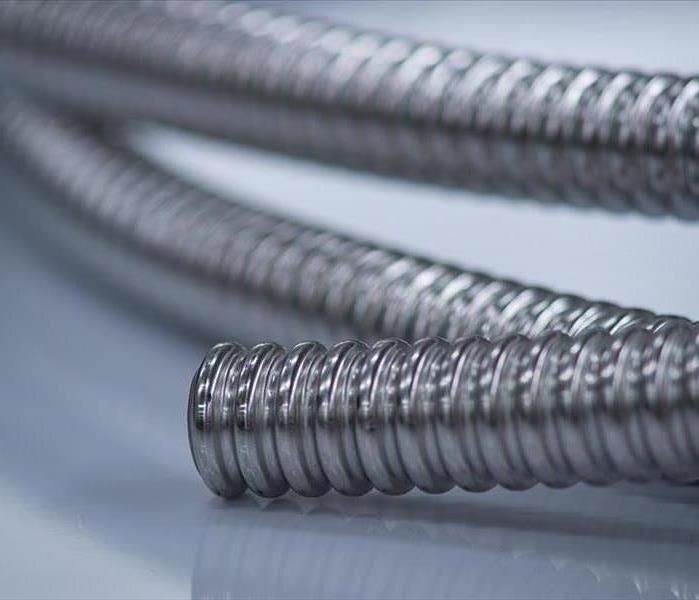 Stainless steel is a more durable alternative to a rubber hose
Stainless steel is a more durable alternative to a rubber hose
Washing machines are one of our trustiest work horses in the home. Researchers estimate that the average family of four does about 8 to 10 loads of laundry a week; that’s over 500 loads of laundry a year! If you take care of your washing machine it will thank you with longevity and will continue to operate smoothly. Heed these maintenance tips to prevent a mishap and to keep your work horse running happily:
- Replace your washing machine lines every 3-5 years. Each time the machine is turned on or off, the lines are contracting and expanding which leads to eventual wear and tear. Replacing those lines will lead to a longer-lasting machine.
- If you have rubber hoses, replace them with stainless steel braided hoses to prevent flooding inside your home.
- Replacing your machine lines are as easy as replacing your outdoor hoses. But remember to make sure your water is shut off before you begin and then secure the line with a wrench.
- Check your hoses for leaks at least once a year.
Despite maintenance, however, sometimes the unexpected happens and your washing machine line springs a leak causing water damage. You can rest assured that SERVPRO of Jackson/Crockett County is here to help.
We understand that when you call us, you may be feeling confused, stressed, and vulnerable. You need an expert to guide you through this crisis. SERVPRO of Jackson/Crockett County has the specific water damage training and experience to help you through this tough time. We specialize in water damage restoration—in fact, it's the cornerstone of our business.
What to Expect
When you call, we will ask several questions regarding your water damage emergency. These questions will help us determine what equipment and resources to bring, including how many trained SERVPRO professionals may be needed.
Our SERVPRO Representative will ask several questions:
- Your name and contact information
- Your insurance information (if applicable)
- The street address of the water-damaged home or business
- When the flooding or water damage occurred
- What caused the water damage (if known)
- If electricity is available (on-site)
- How you heard about SERVPRO of Jackson/Crockett County
Our professionals vow to listen to your concerns and guide you through our remediation plan. So, call SERVPRO of Jackson/Crockett County at 731-423-9944 and let us get you out of deep water!
Tips to Avoid Frozen Pipes
11/11/2019 (Permalink)
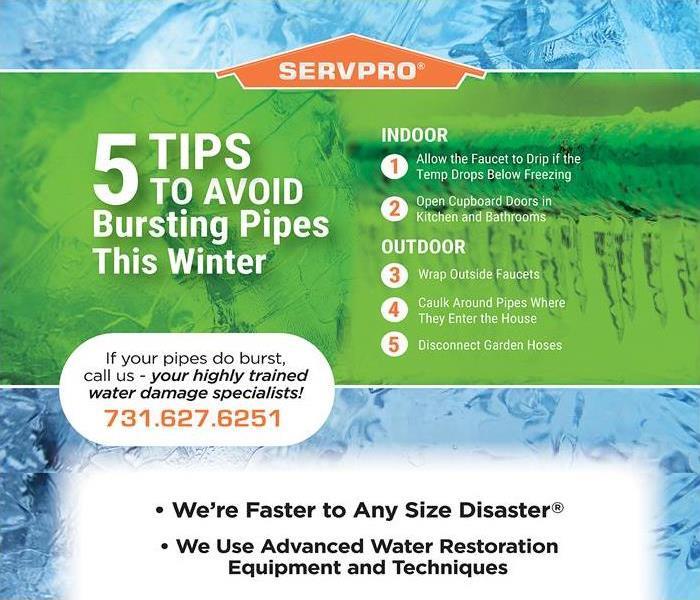 Avoiding frozen pipes.
Avoiding frozen pipes.
It's getting cold outside and we have several tips to help you avoid frozen pipes this winter.
INDOOR:
1. Allow the faucet to drip if the temp drops below freezing.
2. Open cupboard doors in the kitchen and bathrooms.
OUTDOOR:
3. Wrap outside faucets.
4. Caulk around pipes where they enter the house.
5. Disconnect garden hoses.
If your pipes do burst, call us - your highly-trained water damage specialists! (731) 627-6251.
We at SERVPRO of Dyersburg/Union City want to make your water damage "Like it never even happened." Call us today and see how we can help you!
How to Get Flood Insurance
11/19/2018 (Permalink)
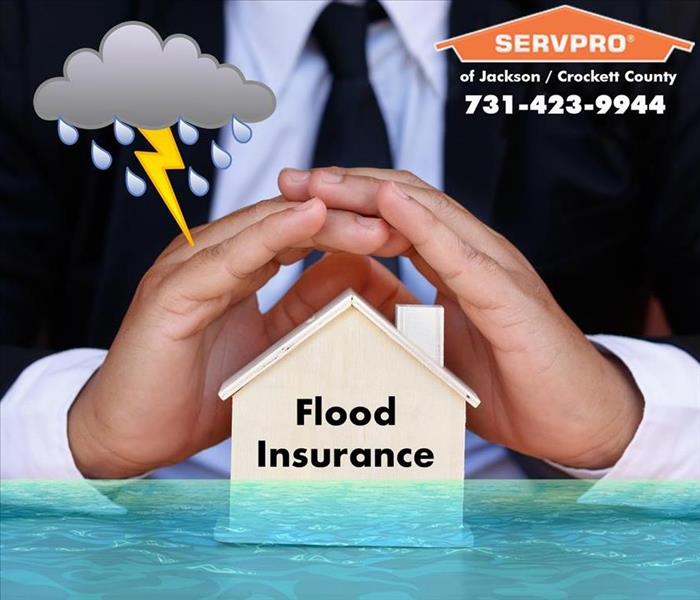 SERVPRO of Jackson/Crockett County
SERVPRO of Jackson/Crockett County
Water Damage & Insurance in Jackson/Crockett County:
Most insurance rates vary by company. Rules for insurance vary by state. Flood insurance is an exception.
Most property insurance does not cover flood damage.
Some homeowners’ policies will cover water damage if the damage comes from:
- sewer or drain backup
- sudden & accidental damage from plumbing, heating systems, or air conditioning
The policy might also cover mold remediation, but not if a flood caused the problem.
How to get flood insurance in Jackson/Crockett County:
- Check whether your community participates in the National Flood Insurance Program (NFIP). You can still get flood insurance if you live in a low-risk area. The insurance will cost less if you live in a low-risk area.
- Find an insurance agent in Jackson/Crockett County. The NFIP is the only flood-insurance provider, but the government does not sell it. Buy the insurance through an insurance agent. The NFIP sets the rates.
- If your insurance agent doesn’t know about the NFIP, call the help center at 1-800-427-4661
Links:
https://www.usa.gov/property-insurance
www.fema.gov
Stay Informed During Floods
10/20/2018 (Permalink)
It's important to stay vigilante when the storms and floods are heading your way. Ready.gov has some great advice on keeping you and your loved ones safe during floods.
Failing to evacuate flooded areas, entering flood waters, or remaining after a flood has passed can result in injury or death. Flooding is a temporary overflow of water onto land that is normally dry. Floods are the most common natural disaster in the United States. Floods may:
- Result from rain, snow, coastal storms, storm surges, and overflows of dams and other water systems.
- Develop slowly or quickly – Flash floods can come with no warning.
- Cause outages, disrupt transportation, damage buildings, and create landslides.
IF YOU ARE UNDER A FLOOD WARNING, FIND SAFE SHELTER RIGHT AWAY
- Do not walk, swim, or drive through flood waters. Turn Around, Don’t Drown!
- Just six inches of moving water can knock you down, and one foot of moving water can sweep your vehicle away.
- Stay off of bridges over fast-moving water.
- Determine how best to protect yourself based on the type of flooding.
- Evacuate if told to do so.
- Move to higher ground or a higher floor.
- Stay where you are.
HOW TO STAY SAFE WHEN A FLOOD THREATENS
Prepare NOW
- Know types of flood risk in your area. Visit FEMA’s Flood Map Service Center for information.
- Sign up for your community’s warning system. The Emergency Alert System (EAS) and National Oceanic and Atmospheric Administration (NOAA) Weather Radio also provide emergency alerts.
- If flash flooding is a risk in your location, then monitor potential signs, such as heavy rain.
- Learn and practice evacuation routes, shelter plans, and flash flood response.
- Gather supplies in case you have to leave immediately, or if services are cut off. Keep in mind each person’s specific needs, including medication. Don’t forget the needs of pets. Obtain extra batteries and charging devices for phones and other critical equipment.
- Purchase or renew a flood insurance policy. It typically takes up to 30 days for a policy to go into effect and can protect the life you've built. Homeowner’s policies do not cover flooding. Get flood coverage under the National Flood Insurance Program (NFIP)
- Keep important documents in a waterproof container. Create password-protected digital copies.
- Protect your property. Move valuables to higher levels. Declutter drains and gutters. Install check valves. Consider a sump pump with a battery.
Survive DURING
- Depending on where you are, and the impact and the warning time of flooding, go to the safe location that you previously identified.
- If told to evacuate, do so immediately. Never drive around barricades. Local responders use them to safely direct traffic out of flooded areas.
- Listen to EAS, NOAA Weather Radio, or local alerting systems for current emergency information and instructions.
- Do not walk, swim, or drive through flood waters. Turn Around. Don’t Drown!
- Stay off bridges over fast-moving water. Fast-moving water can wash bridges away without warning.
- If your vehicle is trapped in rapidly moving water, then stay inside. If water is rising inside the vehicle, then seek refuge on the roof.
- If trapped in a building, then go to its highest level. Do not climb into a closed attic. You may become trapped by rising floodwater. Go on the roof only if necessary. Once there, signal for help.
Be Safe AFTER
- Listen to authorities for information and instructions. Return home only when authorities say it is safe.
- Avoid driving, except in emergencies.
- Snakes and other animals may be in your house. Wear heavy gloves and boots during clean up.
- Be aware of the risk of electrocution. Do not touch electrical equipment if it is wet or if you are standing in water. If it is safe to do so, turn off the electricity to prevent electric shock.
- Avoid wading in floodwater, which can contain dangerous debris and be contaminated. Underground or downed power lines can also electrically charge the water.
- Use a generator or other gasoline-powered machinery ONLY outdoors and away from windows.
The Ins and Outs of Water Emergencies
10/15/2018 (Permalink)
Flooding and water emergencies don’t wait for regular business hours and neither do we. SERVPRO of Dyersburg/Union City provides emergency cleaning and restoration services 24 hours a day, 7 days a week—including all holidays.
Faster to Any Size Disaster
Flooding and water damage is very invasive. Water quickly spreads throughout your home and gets absorbed into floors, walls, furniture, and more. SERVPRO of Jackson/Crockett County arrives quickly and starts the water extraction process almost immediately. This immediate response helps to minimize the damage and the cleaning and restoration costs.
Need Emergency Service? Call Us 24/7 – 731-423-9944
Water Damage Timeline
Within Minutes
- Water quickly spreads throughout your property, saturating everything in its path.
- Water is absorbed into walls, floors, upholstery, and belongings.
- Furniture finishes may bleed, causing permanent staining on carpets.
- Photographs, books, and other paper goods start to swell and warp.
Hours 1 - 24:
- Drywall begins to swell and break down.
- Metal surfaces begin to tarnish.
- Furniture begins to swell and crack.
- Dyes and inks from cloth and paper goods spread and stain.
- A musty odor appears.
48 Hours to 1 Week:
- Mold and mildew may grow and spread.
- Doors, windows, and studs swell and warp.
- Metal begins to rust and corrode.
- Furniture warps and shows signs of mold.
- Paint begins to blister.
- Wood flooring swells and warps.
- Serious biohazard contamination is possible.
More Than 1 Week:
- Restoration time and cost increase dramatically; replacing contaminated materials and structural rebuilding may be extensive.
- Structural safety, mold growth, and biohazard contaminants pose serious risks to occupants.
About SERVPRO of Jackson/Crockett County
SERVPRO of Jackson/Crockett County specializes in the cleanup and restoration of residential and commercial property after a fire, smoke or water damage event. Our staff is highly trained in property damage restoration. From initial and ongoing training at SERVPRO’s corporate training facility to regular IICRC-industry certification, rest assured our staff is equipped with the knowledge to restore your property.
Documents Under Water? SERVPRO has the solution!
10/15/2018 (Permalink)
Is it possible to dry water-damage documents? Yes, it is! What is SERVPRO method? Vacuum Freeze drying!
“The document Restoration Team uses the same technique that the library of Congress uses to dry-water damaged books”.
What is Vacuum Freeze drying? It is the most efficient and effective way to salvage your water-damage documents. The vacuum freeze-drying process can be used to recover and restore paper files, books, and photographs, as well as blue prints, microfiche, x-rays, business archives, etc. Typically, these items are one-of-a-kind or irreplaceable (historical, collectable, legal, medical).
The Document Restoration Team uses a process called “sublimation” to avoid causing more damage to your documents after a flood, for example. Sublimation converts solid into gas. So, here is what happens. As soon as we get your wet or moist documents, we freeze them in a cold storage space. Damaged documents should be frozen as quickly as possible to stabilize them, and prevent further damage. The water in your documents becomes ice, a solid element. Next, using Vacuum Freeze Drying Chamber, located in Jackson, we extract the ice by sublimation. That is to say that the ice in your papers becomes gas or water vapor in order to be vacuumed.
This extraordinary technology used by SERVPRO is the only method approved by the National Archives and Records Administration (NARA) and the General Services Administration (GSA).
Why is Vacuum Freeze drying the best method? Well, other methods like dehumidification can alter the structure of the paper’s fibers causing them to become more brittle.
Once your items arrive at a SERVPRO facility, 24/7 video surveillance is guaranteed. Standard drying time is 7-10 days, but it could vary based on moisture content and backlog.
The Document Restoration Team offers cleaning, trimming from fire damage, refile jacketing, deodorization, gamma irradiation, and basic drying.
Safety in the Floods
9/11/2018 (Permalink)
The rainy season will be here before you know it and with it comes the possibility of floods. Here are a few tips to help you prepare ahead of a flood:
- Tip #1: If an evacuation is necessary, turn utilities off at your breaker panel before you leave your home.
- Tip #2: Only return home after local authorities say it is okay to do so.
- Tip #3: Listen to water advisories and make sure water is safe to drink and bathe in.
BONUS TIP: Post-flood, to prevent carbon monoxide poisoning, use generators at least 20 feet from windows or vents.
About SERVPRO of Jackson/Crockett County
SERVPRO of Jackson/Crockett County understands the stress and worry that comes with a fire or water damage and the disruption it causes your life and home or business. Our goal is to help minimize the interruption to your life and quickly make it "Like it never even happened."
SERVPRO of Jackson/Crockett County specializes in the cleanup and restoration of residential and commercial property after a fire, smoke or water damage. SERVPRO of Jackson/Crockett County can also mitigate mold and mildew from your home or business.
Our staff is highly trained in property damage restoration. From initial and ongoing training at SERVPRO’s corporate training facility to regular IICRC-industry certification, rest assured our staff is equipped with the knowledge to restore your property. With a nationwide system of qualified franchises, no damage is too large or too small for SERVPRO of Jackson/Crockett County.
If you would like to schedule service for your home or business, please call us today at (731) 423-9944!
Serving you since 1967, SERVPRO is the cleaning and restoration brand you know and trust.
Insurance and Payment Information
For a stress-free claims process, SERVPRO works with your insurance to help manage the insurance process and paperwork.
Certifications
- AMRT - Applied Microbial Remediation Technician
- ASD - Applied Structural Drying Technician
- CCT - Carpet Cleaning Technician
- FSRT - Fire & Smoke Damage Restoration Technician
- IICRC Certified Firm
- UFT - Upholstery & Fabric Cleaning Technician
- WRT - Water Damage Restoration Technician
Affiliations
- Kiwanis
- Madison County Chamber of Commerce
Awards
Congratulations to our four new Water Damage Restoration Technicians
9/1/2017 (Permalink)
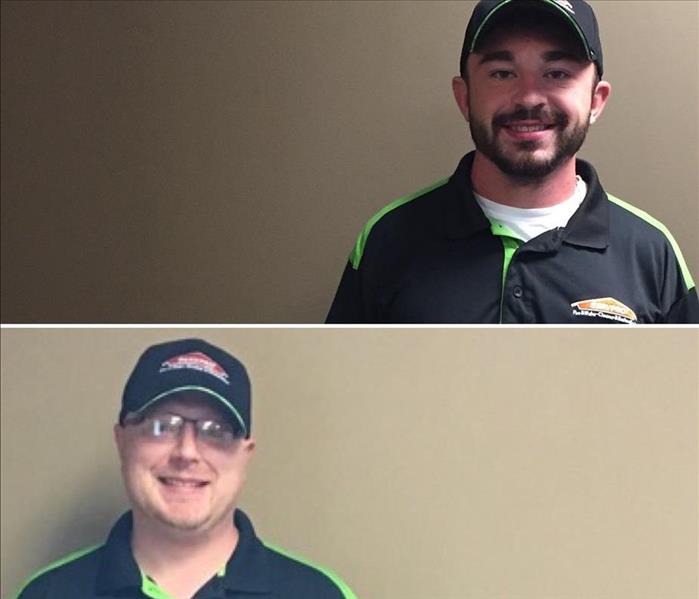 Mike Jeter and Taylor Callens
Mike Jeter and Taylor Callens
Who to call when water problems arise, such as floods, broken pipes or malfunctioning appliances? SERVPRO has the most professional team in the market!
From Monday August 14th to Wednesday August 16th, 2017, Dustin Murdock, Mike Jeter, and Taylor Callens headed to Gallatin, Tennessee, to follow the Water Damage Restoration Technician course offered by the Institute of Inspection, Cleaning and Restoration Certification (IICRC). This SERVPRO certification is necessary for the inspection, cleaning, and restoration industries.
These classes are designed to provide restoration personnel a better understanding of the mitigation work they perform. It gives them a better concept of how to best mitigate a water damage, it’s effects and techniques for drying of structures.
The three-day course gives residential and commercial mitigation technicians the science behind the drying to understand the procedures necessary to deal with water losses, sewer backflows, and identify mold.
This type of training allows our team to operate effectively moisture detectors and water extractors. Manual dexterity and good teamwork skills are also necessary to safely and to effectively accomplish their tasks.
We are very proud of our mitigation team members. Congratulations!
What to do when your important documents got water-damaged
8/28/2017 (Permalink)
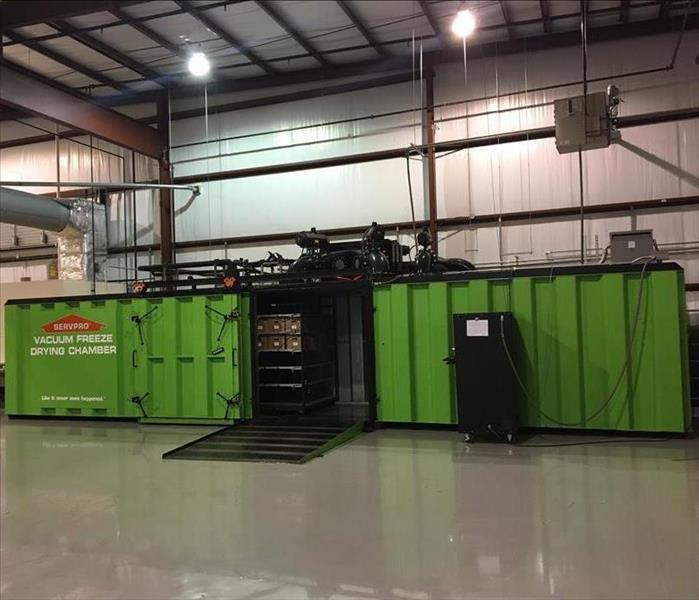 Vacuum Freeze Drying Chamber, located in Jackson
Vacuum Freeze Drying Chamber, located in Jackson
Is it possible to dry water-damage documents? Yes, it is! What is SERVPRO method? Vacuum Freeze drying!
“The document Restoration Team uses the same technique that the library of Congress uses to dry-water damaged books”.
What is Vacuum Freeze drying? It is the most efficient and effective way to salvage your water-damage documents. The vacuum freeze-drying process can be used to recover and restore paper files, books, and photographs, as well as blue prints, microfiche, x-rays, business archives, etc. Typically, these items are one-of-a-kind or irreplaceable (historical, collectable, legal, medical).
The Document Restoration Team uses a process called “sublimation” to avoid causing more damage to your documents after a flood, for example. Sublimation converts solid into gas. So, here is what happens. As soon as we get your wet or moist documents, we freeze them in a cold storage space. Damaged documents should be frozen as quickly as possible to stabilize them, and prevent further damage. The water in your documents becomes ice, a solid element. Next, using Vacuum Freeze Drying Chamber, located in Jackson, we extract the ice by sublimation. That is to say that the ice in your papers becomes gas or water vapor in order to be vacuumed.
This extraordinary technology used by SERVPRO is the only method approved by the National Archives and Records Administration (NARA) and the General Services Administration (GSA).
Why is Vacuum Freeze drying the best method? Well, other methods like dehumidification can alter the structure of the paper’s fibers causing them to become more brittle.
Once your items arrive at a SERVPRO facility, 24/7 video surveillance is guaranteed. Standard drying time is 7-10 days, but it could vary based on moisture content and backlog.
The Document Restoration Team offers cleaning, trimming from fire damage, refile jacketing, deodorization, gamma irradiation, and basic drying.
Other services from the Document Restoration Team
8/28/2017 (Permalink)
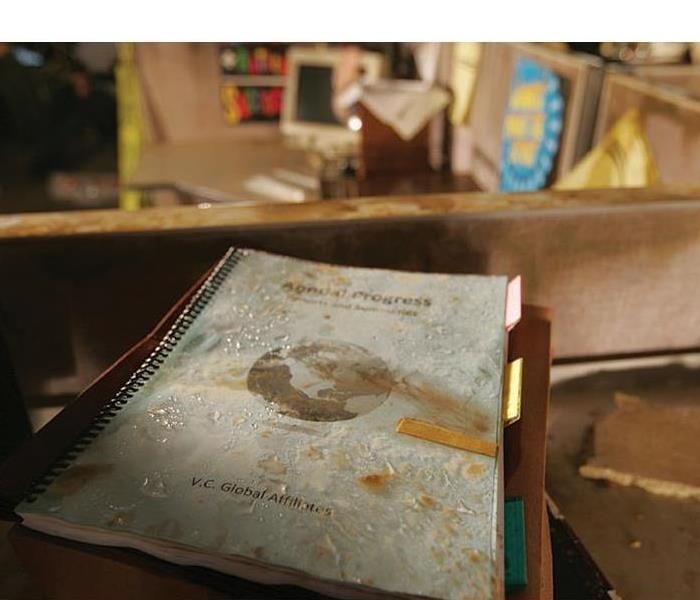 Our state-of-the-art equipment will allow SERVPRO recover your important documents.
Our state-of-the-art equipment will allow SERVPRO recover your important documents.
Was your residence or business victim of sewage, a storm or a flood water situation? Was your file room damage by water or smoke? Do your business or government organization need to properly destroy sensitive documents?
Fortunately for you and your organization, SERVPRO has great cleaning and restoring services for your important documents.
Drying
In order to recover and restore your important documents, our Document Restoration Team uses Vacuum Freeze drying, a process in which an item containing moisture is frozen and dried using vacuums and pressures to achieve an interesting process called “sublimation”. It is the most efficient and effective way to salvage your water-damage documents.
Cleaning
We offer onsite cleaning. This is cleaning each document front and back to remove debris and any surface particulate.
Sterilization
How to disinfect and decontaminate documents or other consumer goods? SERVPRO uses Gamma Irridation. High-energy photons are emitted from an isotope source (Cobalt 60) producing ionization (electron disruptions) throughout a product.
In a sewage or flood water situation, your documents are not only deteriorating but are also infected with all types of bacteria. In most storm situations you are dealing with this problem; therefore, most of the affected documents that you will encounter will be contaminated. If this is the case, then decontamination is always a must.
In living cells, these disruptions result in damage to the DNA and other cellular structures. These photon-induced changes at the molecular level cause the death of the organism or render the organism incapable of reproduction. The gamma process does not create residuals or impart radioactivity in processed products.
Deodorization
Once paper has been wet, an odor can begin to form. Letting us deodorize your documents will reduce the odor and sometimes almost completely eliminate it.
Destruction
We offer destruction onsite. Many businesses and government agencies have to dispose of counterfeit, faulty, expired, or contaminated materials. All entities need to be certified that their products and materials are destroyed.
The guarantee of certified destruction is to protect one’s liabilities, brand image, or proprietary information. We guarantee certified destruction to give you peace of mind that your documents are disposed of properly.
Digitization
Digitizing documents makes them easier to access as well as easier to store. We use state-of-the-art equipment to turn your paper copy into a digital file.
With the new age of technology digitizing records and documents has become a standard practice in most industries. This eliminates the need to have massive file storage rooms and allows us to access records at the click of a button.
If your file room was damaged by water, or smoke, and need to be cleaned, dried, or decontaminated, digitizing might be a good choice to eliminate the need to have hundreds or even thousands of documents and records in storage.
Faster to your Jackson/Crockett County Water Damage Event
8/31/2016 (Permalink)
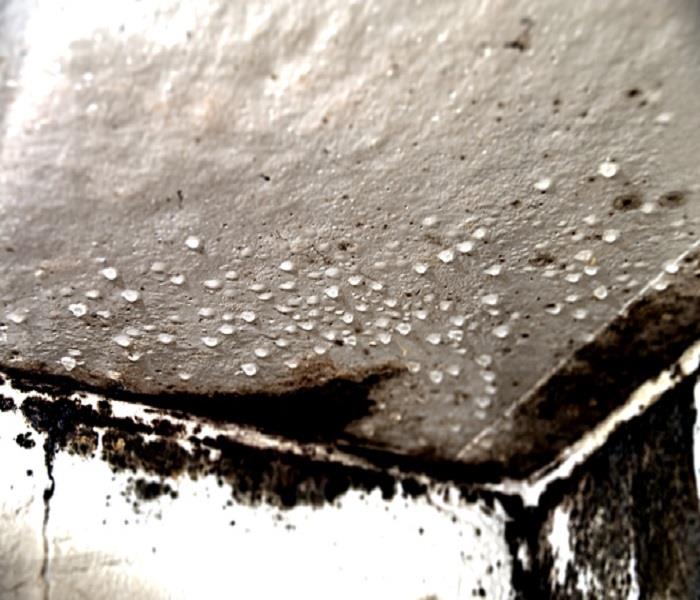 SERVPRO of Jackson/Crockett County provides 24-hour fire and water damage restoration service in Jackson/Crockett County
SERVPRO of Jackson/Crockett County provides 24-hour fire and water damage restoration service in Jackson/Crockett County
Flooding and water emergencies don’t wait for regular business hours and neither do we. SERVPRO of Jackson/Crockett County provides emergency cleaning and restoration services 24 hours a day, 7 days a week—including all holidays.
Faster to Any Size Disaster
Flooding and water damage is very invasive. Water quickly spreads throughout your home and gets absorbed into floors, walls, furniture, and more. SERVPRO of Jackson/Crockett County arrives quickly and starts the water extraction process almost immediately. This immediate response helps to minimize the damage and the cleaning and restoration costs.
Need Emergency Service? Call Us 24/7 – 731-423-9944
Water Damage Timeline
Within Minutes
- Water quickly spreads throughout your property, saturating everything in its path.
- Water is absorbed into walls, floors, upholstery, and belongings.
- Furniture finishes may bleed, causing permanent staining on carpets.
- Photographs, books, and other paper goods start to swell and warp.
Hours 1 - 24:
- Drywall begins to swell and break down.
- Metal surfaces begin to tarnish.
- Furniture begins to swell and crack.
- Dyes and inks from cloth and paper goods spread and stain.
- A musty odor appears.
48 Hours to 1 Week:
- Mold and mildew may grow and spread.
- Doors, windows, and studs swell and warp.
- Metal begins to rust and corrode.
- Furniture warps and shows signs of mold.
- Paint begins to blister.
- Wood flooring swells and warps.
- Serious biohazard contamination is possible.
More Than 1 Week:
- Restoration time and cost increase dramatically; replacing contaminated materials and structural rebuilding may be extensive.
- Structural safety, mold growth, and biohazard contaminants pose serious risks to occupants.
About SERVPRO of Jackson/Crockett County
SERVPRO of Jackson/Crockett County specializes in the cleanup and restoration of residential and commercial property after a fire, smoke or water damage event. Our staff is highly trained in property damage restoration. From initial and ongoing training at SERVPRO’s corporate training facility to regular IICRC-industry certification, rest assured our staff is equipped with the knowledge to restore your property.






 24/7 Emergency Service
24/7 Emergency Service
